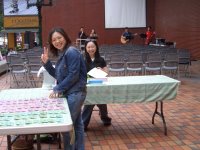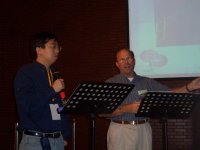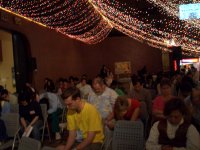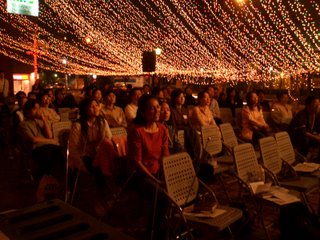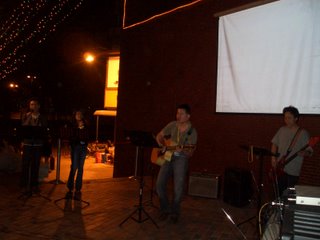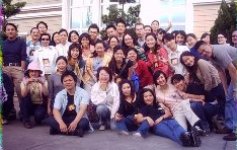by Kevin OffnerEditor's note: Many of us are struggling with being too busy…… too busy to pray, to read, to serve God or even too busy to come to church…… Hope this article can challenge us all……------------------------------------------------------------------------------------I
would love to pray more, read more, write in my journal more, take long walks, be still in God's presence, spend more time getting to know friends, or take up this or that hobby - but I'm just too busy. I don't have time.
All of my life I've taken solace in that phrase: "I'm just too busy." I've convinced myself all of these years that the real reasons for my busyness were external to myself - it's not my fault, you see, rather it's because of my job, those deadlines, the traffic, the city (oh, to be somewhere more rural!) or others' demands on me. Surely, if these external factors could be removed, why, I would immediately feel less restless, move more slowly and make time for those other important things.
Well, recently I was able to take a sabbatical. I was given eight months in England to slow down, rejuvenate and reflect. But much to my amazement, most of those eight months found me as busy as ever. And I had been stripped of all my excuses! I realized then that I'm somehow enslaved to busyness and scared to death of having nothing to do. A little voice from somewhere inside screams, "Kevin, you must produce! What did you accomplish today? How has the world changed today because of your initiatives? Watch out - you're getting lazy! You're wasting time! Get off your rear and do something!!"
I've learned that our fast-paced lifestyles are not primarily due to external factors; external factors are more the symptom than the cause. We are not restless because we are busy; we are busy because we are restless. In fact, many of us are actually addicted to busyness! We are afraid of silence. Keeping busy prevents us from having to face our empty souls. When I'm always filling my time with reading the newspaper, eating a snack, running to catch a bus, making several quick phone calls, listening to music or seeing how many errands I can accomplish in a short period of time, I don't have to acknowledge how little I pray, how little I really know about or care for my friends or how little I know myself.
We bow to the "Idol of the Full Schedule" because it gives a superficial, temporary legitimacy to our lives. When we accomplish a lot we feel important, needed and necessary. We set ourselves dozens of daily goals, and if we meet most of them we feel successful. We long for a daily reassurance that we are loved - and we turn to a kind of "activism" to meet this need. We say we believe in grace, we say we believe that God's love is unconditional and that our justification in him is not based on our works, and yet in practice we live as though we've been abandoned or orphaned. We're convinced we must work in order to be approved.
Of course the point is not to exchange busyness for inactivity. Work is a good thing: God gave Adam and Eve work to do in the Garden even before they sinned. Also, we are told in the "Parable of the Talents" that it's the wise investor of one's abilities who will one day be rewarded. Our Lord Jesus himself was hard at work from sunrise to sunset. No, we don't need to stop working; but we may be pursuing the wrong work. We are to be busy or not busy because of obedience to God's call, not because of a nervous striving for self-worth. Knowing in our heart of hearts that we are fully accepted and loved by God in Christ, we do whatever work God calls us to do out of joy, peace and gratitude. Part of growing in grace, then, is to know what one's work is, when to work and when to rest. And we'll know this more surely as we grow to know God better.
We want to work voluntarily and enthusiastically, in response to God's initiative, not our restlessness. And we want to learn how to rest. Here are a few practical steps to take:
- Guard time alone with God. The Lord Jesus was as busy as anyone and yet it was his habit to arise "a great while before dawn" to pray.
- Guard the Sabbath. Let's be ruthless in keeping at least a day a week free, a different day from the other six. No scheduling of meetings, no homework and no agendas. A day to focus on God in a special way. A day to slow down, take inventory and be spontaneous.
- Always schedule large gaps between activities when possible. Get to places and appointments early and use that extra time to become quiet inside.
- Be as "fully present" as possible at each activity or with each person. Avoid turning to past conversations or future concerns, but rather give undivided attention to the immediate present.
- Spend more time in deliberate reflection. After conversations with people, at night before going to sleep and on your Sabbath day (Sundays are great for this!), ask deeper questions: what was the significance of that person's remark? That movie's main theme? or That class assignment's bigger issues? Write in a journal, write letters to others, reflect with close friends and meditate under God's eye. Always be open to what you might learn from God's providence by being a careful observer of life's experiences and people.
Let's be honest with ourselves and face the real reasons why we feel so compelled to busyness. And then, by God's grace, let's resolve to make better choices with how we use our time.
